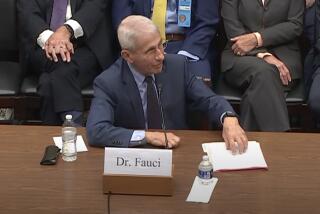Wall Street executives admit mistakes before financial crisis
- Share via
Reporting from Washington — The heads of major Wall Street firms admitted mistakes in leading up to the financial crisis today but didn’t take direct blame as they answered some tough questions at the first public hearing of a government panel investigating the causes of the meltdown.
“There’s no doubt we as an industry made mistakes,” said John Mack, chairman of Morgan Stanley. Among those mistakes were making large bets on the continued rise in housing prices and selling securities and other products made up of subprime mortgages.
“We did eat our own cooking and we choked on it,” he said.
Goldman Sachs Group Inc. Chief Executive Lloyd Blankfein said large financial institutions didn’t realize the risks they were taking as they invested more heavily in the residential housing market during the real estate boom in the early 2000s. His firm and others rationalized the increasing risks of lowered credit standards, part of a “systemic lack of skepticism,” he said.
“We lent money out too cheaply and in certain loans without the traditional safeguards,” Blankfein said. “We didn’t realize early enough that risk was being mispriced.”
Jamie Dimon, chief executive of JPMorgan Chase & Co., made a stunning admission that spoke to the unbridled optimism about the housing market before the bubble burst.
“Somehow we just missed that home prices don’t go up forever,” he said, admitting that JPMorgan Chase never tested their exposure to a 40% drop in home prices even though they tested almost every other market scenario.
The executives were among the witnesses as the Financial Crisis Inquiry Commission began the public portion of its investigation. Also testifying was Brian Moynihan, the new chief executive of Bank of America Corp.
“We’re after the truth, the hard facts. . . . People are angry. They have a right to be,” Phil Angelides, the commission’s chairman, said in kicking off two days of hearings. “If we ignore history, we’re doomed to bail it out again.”
Angelides, the former California state treasurer, was the toughest questioner on the panel. He specifically honed in on Blankfein, challenging him on Goldman’s practice of selling securities containing subprime mortgages and then shorting those investments to hedge the firm’s risk.
Blankfein admitted the practice was “improper” and that “We regret the consequence that people may have lost money.” But he said such actions were the role of a “market maker” firm such as Goldman to manage its risk.
“I’m just going to be blunt with you,” Angelides responded. “It sounds to me a little bit like selling a car with faulty brakes and then buying an insurance policy on the buyer of those cars.”
The two continued to spar for a few more minutes in the most contentious part of the three-hour session. Blankfein said it was difficult to assess risk after a major crisis. He noted that the assessment of the risk of a hurricane was greater after a season in which four major hurricanes hit the East Coast.
“Acts of God are exempt,” Angelides shot back. “These were acts of men and women.”
The Wall Street executives largely defended their pay and compensation practices. They also said poor government regulation played a role in the crisis and pressed for changes, including new oversight of risk in the broader financial system and a way for large firms to fail without seriously damaging the economy. The Obama administration has proposed such changes in an overhaul of the financial regulatory system now moving through Congress.
“We cannot and should not take risk out of the system; that’s what drives the engine of our capitalist economy. But no firm should be too big to fail,” Mack said.
Dimon said he wanted to be clear that he was not blaming regulators, but the companies.
“I blame the management teams 100% and no one else,” he said. JPMorgan Chase should have been more diligent about its lending standards and financial firms became over-reliant on short-term financing, Dimon said. In addition, “excessive leverage, even from consumers, pervaded the system” leading up to the crisis, he said.
Moynihan said Bank of America understood the public anger and was grateful for the $45 billion in taxpayer bailout money it had received. He noted the firm had repaid the entire amount, along with $3 billion in dividends and other payments. But, he added, “We as managers need to run our companies so this never happens again.”
The commission was created by Congress last year and patterned on the bipartisan panel that investigated the causes of the Sept. 11, 2001, terrorist attacks. Congress also launched a similar inquiry, known as the Pecora Commission, after the Great Depression, and those findings led to major financial reforms.
Angelides, the 2006 Democratic nominee for governor, was appointed by congressional Democratic leaders to head the commission. Republicans chose former Central Valley Rep. Bill Thomas, a onetime chairman of the House Ways and Means Committee, as the vice chair. The 10-member panel has six Democratic appointees and four Republicans. It must produce a report on the causes of the crisis by Dec. 15.
More to Read
Inside the business of entertainment
The Wide Shot brings you news, analysis and insights on everything from streaming wars to production — and what it all means for the future.
You may occasionally receive promotional content from the Los Angeles Times.











